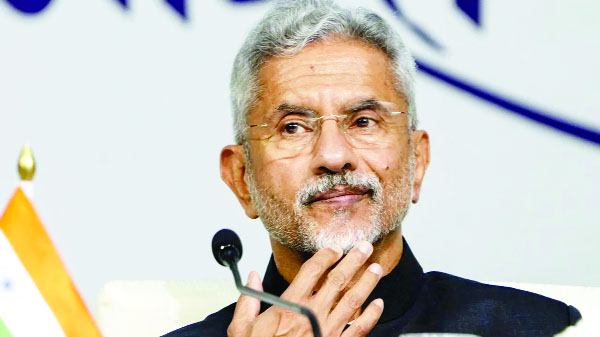NEW DELHI, Apr 24
External Affairs Minister S Jaishankar Monday said that the “faith” and “vote bank” have influenced the policy of India in the past however changes have occurred in the policymaking today. He underlined that during the initial years of independence, certain decisions made by India’s policymakers ended up causing problems for the country in the long run.
Speaking at ‘Foreign Policy The India Way: From Diffidence To Confidence’ in Hyderabad, Telangana on Tuesday, Jaishankar said, “When we say an era of diffidence, it is not just an era of diffidence, it’s an era where we don’t have clarity, our nationalities. We somewhere, mixed a certain ideological outlook…what could be our contribution to the world.”
“We also do many things for the world but that cannot be at the cost of our national interest. That’s why ‘India First’, ‘Bharat First’ and ‘Vasudhaiva Kutumbakam’ are two sides of the same coin, but we should never allow Bharat First to be compromised,” he added.
Giving the example of India’s relationship with Israel, the EAM pointed out India didn’t have an embassy in Israel till 1992 and no Prime Minister visited the country before PM Modi. He further opined that how “vote bank” influenced India’s policy.
“Just think of a country like Israel. People say everybody is the same, we should not bring faith in any discussion. Israel became independent in 1948. From 1948 to 1992, we chose not to have an ambassador and an embassy in Israel. Why? From 1992, we had an embassy. From 1992 till 2017, when Narendra Modi went to Israel, no prime minister of India ever visited Israel. Think about it and then tell me that faith does not influence our policy. Is this not vote bank?” Jaishankar further asserted. Emphasising the importance of abrogation of Article 370, Jaishankar said that the Indian leadership had created a “vote bank lobby” that kept the special provision intact in the erstwhile state. He also emphasised that it was a ‘temporary’ provision and had to be ended.
“Please understand the importance of what we did with the abrogation of Article 370. We have corrected an enormous mistake, we made in 1947. We created a lobby, we created a vote bank lobby, we created a Kashmiri lobby, some people were arbitraging,” the Foreign Minister said.”I would show to everybody in the Western press one page of the Constitution called temporary provision. You know the meaning of the word temporary, it comes to an end. There is nobody as blind as someone who doesn’t want to see,” he added.
He criticised India for signing the Nehru-Liaquat Pact with Pakistan in 1950 despite seeing the violent fervours of partition three years back.
Speaking on the issue of the Citizenship Amendment Act, without naming it, he said that after the number of Hindus, Sikhs and other minorities plummeted since partition, India is trying to give citizenship to those people who have nowhere else to go.
“Partition has happened, you can see the violence that has happened and yet we agree with Pakistan that you will treat your minorities well and I will treat my minorities well. If they had treated the minorities well, there would have been no partition. He went to partition with the mindset of not treating the minority well,” Jaishankar said.
“See the result, look at the dramatic decrease in the number of minorities. We had finally the situation, that you have minorities in your neighbourhood… whose only logical place to go is India. And yet when we do something very logical, we are correcting a mistake we made 75 years ago…I am giving people rights, I am not taking away people’s rights…I am telling people who have nowhere else to go that please come here and I will try my best to fast-track to do whatever I can to help them,” he further added.
He further said that today there is a change in the mindset of India’s policymaking which is making the country act, think, behave and stand very differently than before.
“You can see how much vichaardhara (ideology) shapes thinking and when we speak about diffidence to confidence…it is a different mindset. It is the change in the mindset today that is making us act, think, behave, stand very differently,” he added.



























